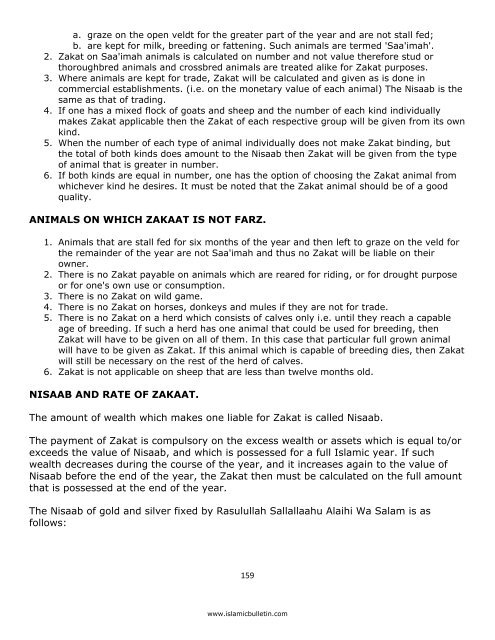Create successful ePaper yourself
Turn your PDF publications into a flip-book with our unique Google optimized e-Paper software.
a. graze on the open veldt for the greater part of the year and are not stall fed;<br />
b. are kept for milk, breeding or fattening. Such animals are termed 'Saa'imah'.<br />
2. Zakat on Saa'imah animals is calculated on number and not value therefore stud or<br />
thoroughbred animals and crossbred animals are treated alike for Zakat purposes.<br />
3. Where animals are kept for trade, Zakat will be calculated and given as is done in<br />
commercial establishments. (i.e. on the monetary value of each animal) The Nisaab is the<br />
same as that of trading.<br />
4. If one has a mixed flock of goats and sheep and the number of each kind individually<br />
makes Zakat applicable then the Zakat of each respective group will be given from its own<br />
kind.<br />
5. When the number of each type of animal individually does not make Zakat binding, but<br />
the total of both kinds does amount to the Nisaab then Zakat will be given from the type<br />
of animal that is greater in number.<br />
6. If both kinds are equal in number, one has the option of choosing the Zakat animal from<br />
whichever kind he desires. It must be noted that the Zakat animal should be of a good<br />
quality.<br />
ANIMALS ON WHICH ZAKAAT IS NOT FARZ.<br />
1. Animals that are stall fed for six months of the year and then left to graze on the veld for<br />
the remainder of the year are not Saa'imah and thus no Zakat will be liable on their<br />
owner.<br />
2. There is no Zakat payable on animals which are reared for riding, or for drought purpose<br />
or for one's own use or consumption.<br />
3. There is no Zakat on wild game.<br />
4. There is no Zakat on horses, donkeys and mules if they are not for trade.<br />
5. There is no Zakat on a herd which consists of calves only i.e. until they reach a capable<br />
age of breeding. If such a herd has one animal that could be used for breeding, then<br />
Zakat will have to be given on all of them. In this case that particular full grown animal<br />
will have to be given as Zakat. If this animal which is capable of breeding dies, then Zakat<br />
will still be necessary on the rest of the herd of calves.<br />
6. Zakat is not applicable on sheep that are less than twelve months old.<br />
NISAAB AND RATE OF ZAKAAT.<br />
The amount of wealth which makes one liable for Zakat is called Nisaab.<br />
The payment of Zakat is compulsory on the excess wealth or assets which is equal to/or<br />
exceeds the value of Nisaab, and which is possessed for a full Islamic year. If such<br />
wealth decreases during the course of the year, and it increases again to the value of<br />
Nisaab before the end of the year, the Zakat then must be calculated on the full amount<br />
that is possessed at the end of the year.<br />
The Nisaab of gold and silver fixed by Rasulullah Sallallaahu Alaihi Wa Salam is as<br />
follows:<br />
159<br />
www.islamicbulletin.com


